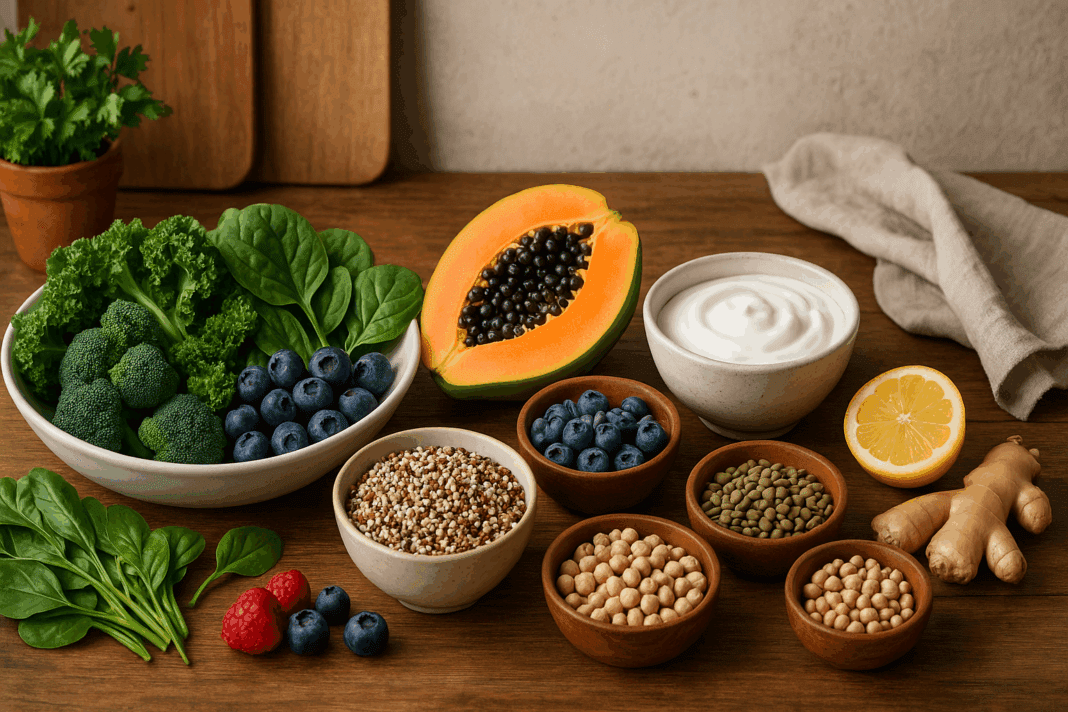A well-functioning digestive system is crucial not only for nutrient absorption but also for overall health and energy levels. People who experience bloating, indigestion, constipation, or sluggishness often turn to dietary solutions for support. Fortunately, a variety of natural options exist, and one of the most effective strategies is to incorporate foods that help digestion into your daily meals. These foods support enzyme function, nourish beneficial gut bacteria, and help move food faster through the gastrointestinal tract. In this comprehensive guide, we’ll explore which nutrient helps digestion the most, how to boost digestion with holistic foods, and what to eat to aid digestion in practical, science-backed ways.
You may also like: The Ultimate Guide to Gut Healthy Meals: Best Meals for Gut Health and Nourishing Recipes You’ll Love
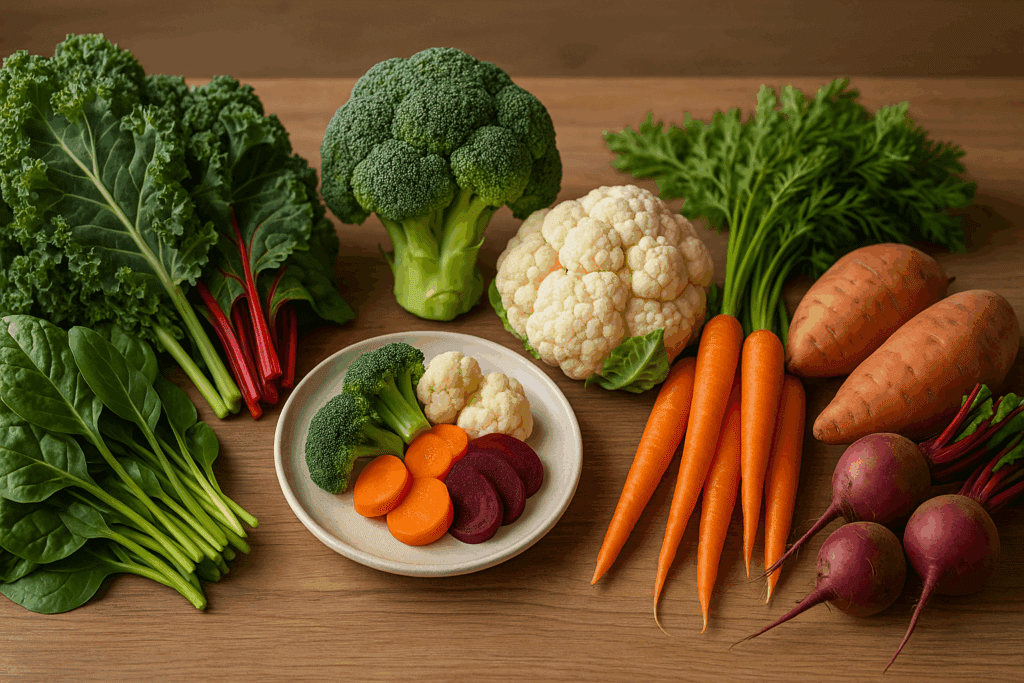
Understanding How Digestion Works and Why It Slows Down
Before diving into the best foods to eat to aid digestion, it’s important to understand the digestive process itself. Digestion begins in the mouth, where chewing breaks down food and enzymes in saliva start the chemical process. As food travels down the esophagus into the stomach and then through the intestines, it undergoes further enzymatic breakdown, nutrient absorption, and eventual waste elimination. A sluggish digestive system can be caused by stress, lack of fiber, poor hydration, sedentary habits, or imbalanced gut bacteria. Understanding these causes can illuminate why foods that help digestion are so effective.
When digestion slows down, symptoms like bloating, gas, heartburn, and constipation can arise. Rather than relying solely on over-the-counter remedies, addressing the root causes through dietary changes is a more holistic and sustainable approach. Learning how to speed up digestion naturally can help you feel lighter, more energized, and healthier overall. As we examine specific foods good for digestion, we’ll also discuss how to improve digestion naturally at home without complicated supplements or procedures.
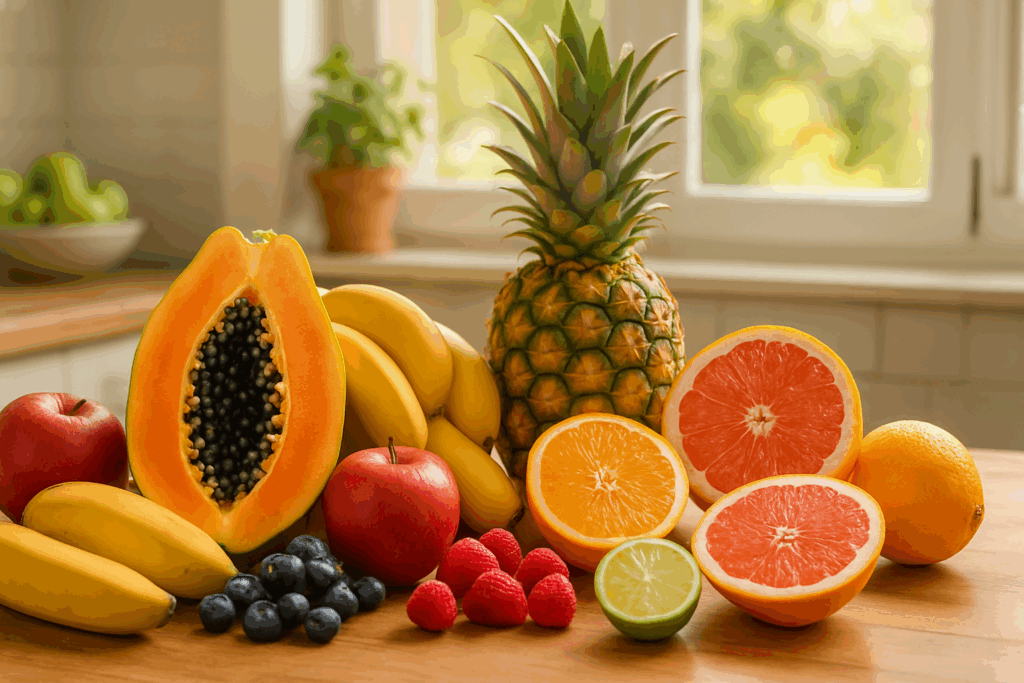
Powerful Vegetables That Aid in Digestion and Support Gut Health
Vegetables are rich in fiber, water, vitamins, and antioxidants, making them essential for digestive wellness. Among the most powerful vegetables that aid in digestion are leafy greens such as spinach, kale, and Swiss chard. These greens contain magnesium, which helps muscle contractions in the digestive tract, ensuring that food moves smoothly through the system. Fiber in these vegetables adds bulk to stools, helping relieve constipation and encouraging regularity.
Cruciferous vegetables like broccoli, cauliflower, and Brussels sprouts are also top choices. They contain sulfur-rich compounds that promote the production of glutathione, a powerful antioxidant that supports liver detoxification and overall digestive efficiency. While some individuals may experience gas from cruciferous vegetables, gradually introducing them into the diet and cooking them can reduce discomfort. For those wondering how to make food easier to digest, lightly steaming vegetables is a simple technique that retains nutrients while softening fibers.
Root vegetables such as carrots, sweet potatoes, and beets further enrich a digestion-boosting diet. Their soluble fiber content supports healthy gut bacteria and helps regulate blood sugar levels. These vegetables work synergistically with other foods that help digestion to form a comprehensive approach to digestive health. Including a wide variety of vegetables in your meals can serve as one of the most effective digestion booster foods available.
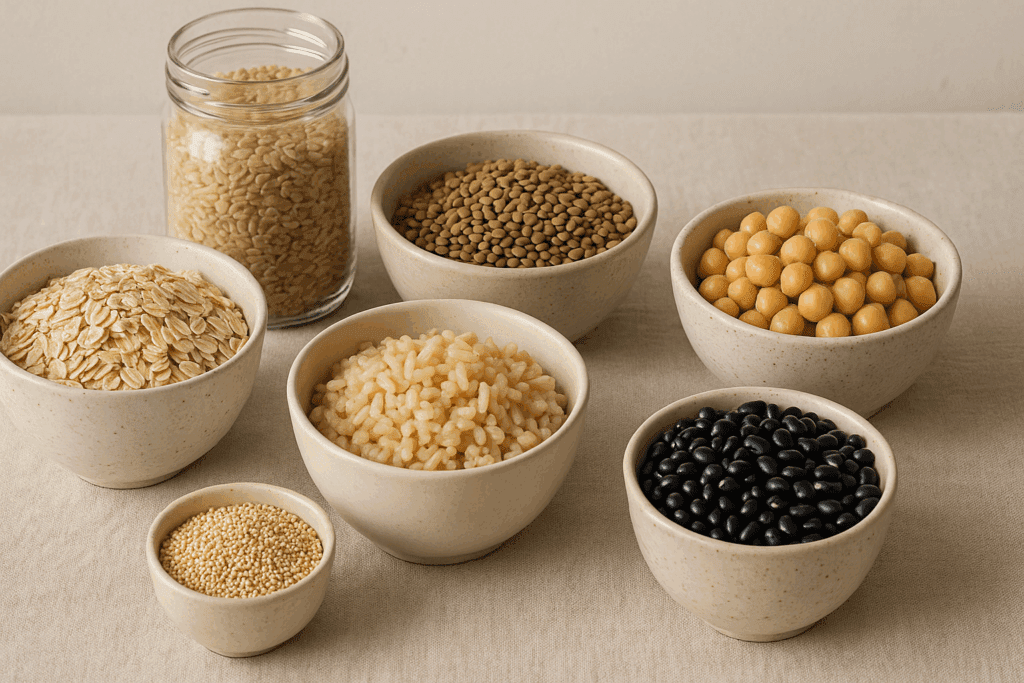
Fruits That Help Digestion and Ease Bloating Naturally
Fruits not only offer natural sweetness but also provide enzymes, fiber, and hydration to support digestion. The best fruit for digestion includes papaya, which contains the enzyme papain that assists in breaking down proteins. Similarly, pineapple delivers bromelain, another protein-digesting enzyme, and is commonly used to relieve indigestion and inflammation. These tropical fruits are particularly helpful for people seeking foods that ease digestion after heavy or protein-rich meals.
Apples, pears, and berries are excellent sources of soluble fiber, especially pectin, which helps soften stools and feeds beneficial gut bacteria. Bananas are another well-known digestive aid; their high potassium content supports electrolyte balance, while resistant starch nourishes the microbiome. If you’ve ever asked, “how can I digest food faster after a large meal?” a banana could be part of the solution.
Citrus fruits like oranges and grapefruits stimulate the production of digestive juices and enzymes, making them ideal additions to a diet to aid digestion. While fruits are generally good for you, consuming them at optimal times—such as between meals or in the morning—can help minimize fermentation and gas. Choosing the best fruits for your needs is a personalized yet crucial part of any digestion-friendly diet.
Whole Grains and Legumes: High-Fiber Foods That Aid Digestion Effectively
Whole grains like oats, brown rice, quinoa, and barley are rich in dietary fiber, particularly insoluble fiber, which adds bulk to the digestive process and encourages regular bowel movements. Incorporating whole grains into your meals not only helps prevent constipation but also supports the health of your gut lining. When wondering what helps with digestion from a long-term perspective, a fiber-rich whole grain diet is often recommended by dietitians.
Legumes such as lentils, chickpeas, and black beans are also potent digestion booster foods. They are high in prebiotics, a type of fiber that nourishes beneficial bacteria in the gut. This fermentation process produces short-chain fatty acids that strengthen the intestinal barrier and reduce inflammation. So, if you’re curious about how to improve digestion or which nutrient helps digestion most effectively, prebiotic fiber deserves attention.
For individuals new to legumes, gradual introduction and proper cooking techniques—like soaking and rinsing—can minimize gas and discomfort. A consistent intake of these foods can teach your body how to digest faster by enhancing the efficiency of microbial activity in your gut. As part of a holistic digestive approach, combining legumes with vegetables and healthy fats creates meals that are both satisfying and digestion-friendly.
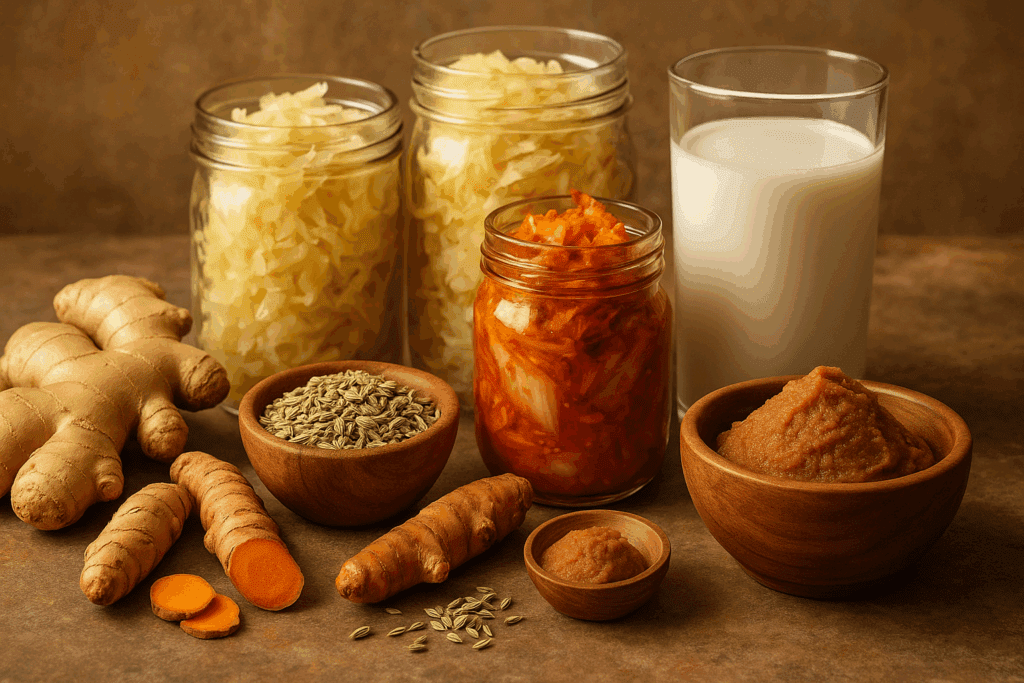
Herbs, Spices, and Fermented Foods That Help Digestion
Beyond standard food groups, certain herbs, spices, and fermented foods offer profound benefits for digestion. Ginger, for example, has been used in traditional medicine for centuries to relieve nausea, improve motility, and soothe the stomach lining. Incorporating fresh ginger into teas, soups, or stir-fries can accelerate digestion and reduce symptoms like bloating and discomfort.
Turmeric is another superstar spice with anti-inflammatory properties that support digestive function. Its active compound, curcumin, stimulates bile production, which aids in the breakdown of fats. Cumin, fennel, and coriander are other spices known to promote better digestion and reduce gas. Adding these to your dishes not only enhances flavor but also serves your gut health.
Fermented foods such as yogurt, kefir, kimchi, sauerkraut, and miso are rich in probiotics—live beneficial bacteria that support the gut microbiome. These foods are among the most effective answers to how to boost digestion naturally. Probiotics enhance enzyme activity, help regulate bowel movements, and reduce inflammation in the digestive tract. Incorporating fermented foods regularly can be one of the simplest and most impactful ways to make food digest faster and more comfortably.
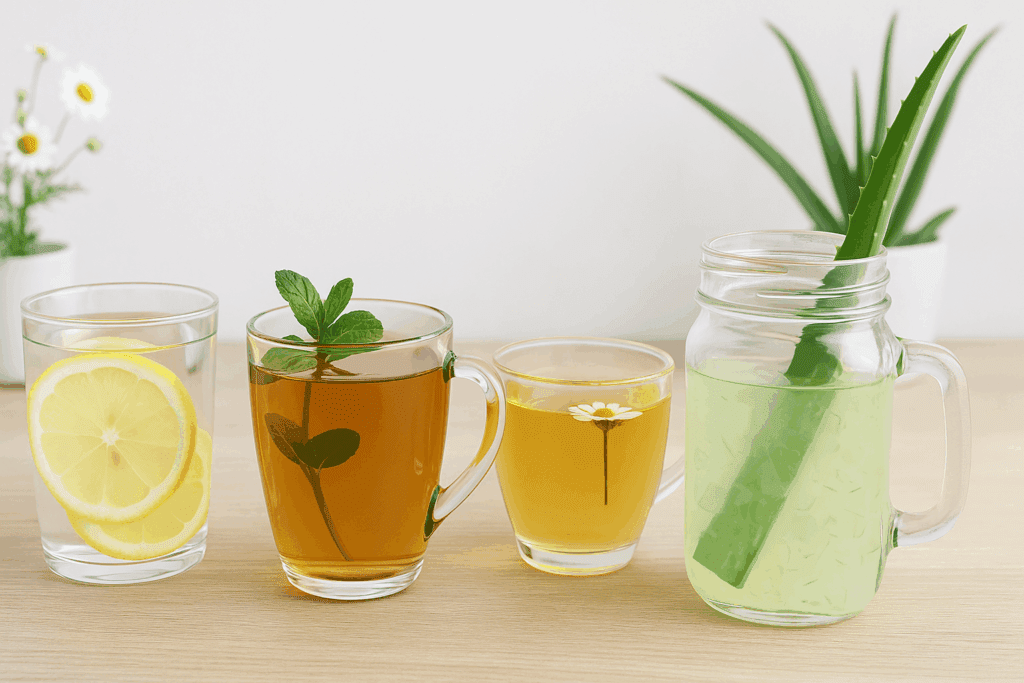
Hydration and Digestion: The Role of Water and Digestive Drinks
While solid foods often take center stage, hydration plays a critical role in digestion. Water helps dissolve nutrients, regulate bowel movements, and transport waste products out of the body. Insufficient fluid intake is a common cause of constipation and sluggish digestion. If you want to learn how to digest faster, one of the most immediate and practical steps is to drink more water throughout the day.
In addition to plain water, certain drinks that are good for digestion include herbal teas like peppermint, chamomile, and dandelion. These teas soothe the digestive tract, reduce bloating, and promote bile flow. Lemon water in the morning is another gentle way to stimulate digestion and rehydrate after a night of fasting. Bone broth is rich in collagen and amino acids that support gut lining integrity and can be an excellent addition to a gut-healing regimen.
Avoiding excessive caffeine, alcohol, and sugary beverages is equally important. These can irritate the digestive tract, disrupt gut flora, and hinder the absorption of nutrients. When asking what to eat to aid digestion, don’t forget to consider what you drink. A balanced intake of hydrating, digestion-supportive beverages complements the effects of foods that help digestion and creates a more complete wellness strategy.
Lifestyle Habits and Food Timing: Enhancing Digestion Beyond the Plate
Although food selection is crucial, lifestyle habits and eating behaviors also influence digestive efficiency. Chewing food thoroughly, for example, is often overlooked but significantly impacts how to make food digest faster. The longer food is chewed, the more it is exposed to enzymes, making the stomach’s job easier. Eating slowly and mindfully prevents overeating and allows the digestive system to process food more effectively.
Meal timing and frequency also matter. Spacing meals out to allow time for digestion reduces bloating and gives the gastrointestinal tract time to rest and reset. Intermittent fasting is one approach that some individuals find helpful in improving digestion, though it should be tailored to individual health needs and preferences. Avoiding late-night meals and lying down immediately after eating can further support smoother digestion.
Physical activity is another factor that plays a role in how to accelerate digestion. Gentle movement, like walking after meals, stimulates intestinal contractions and reduces post-meal sluggishness. In contrast, prolonged sitting or inactivity can contribute to constipation and bloating. Cultivating consistent movement habits complements the effects of foods that aid digestion and helps establish a healthy digestive rhythm.
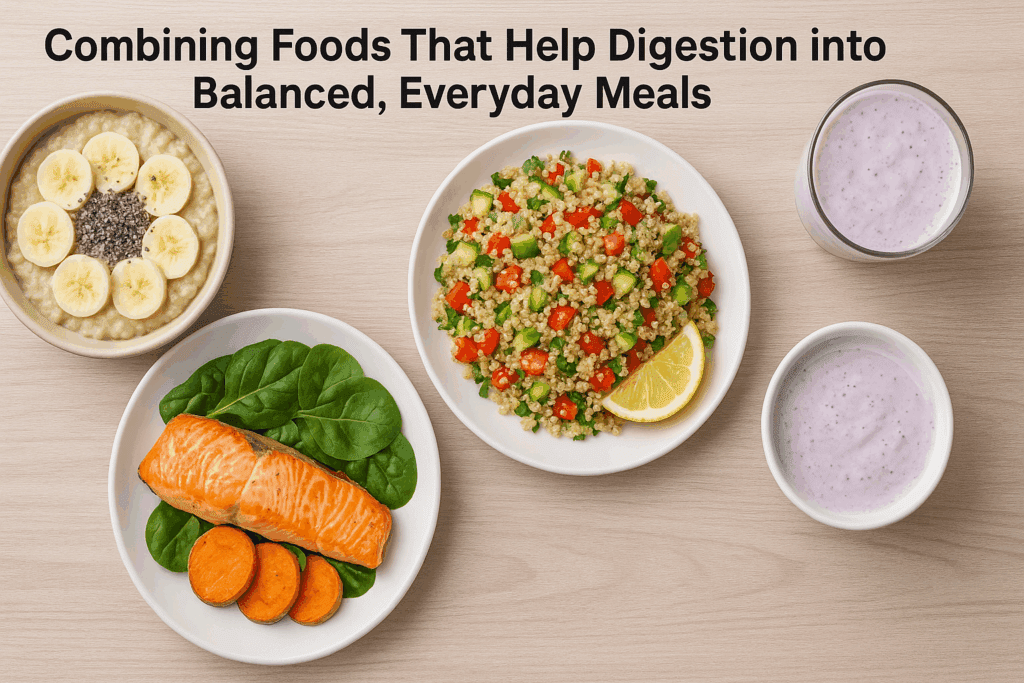
Holistic Supplements and Nutrients That Support Digestive Health
In some cases, dietary adjustments alone may not be sufficient, and targeted supplementation can provide additional support. Digestive enzymes, for example, help break down macronutrients like proteins, fats, and carbohydrates. These are particularly useful for individuals with enzyme deficiencies or those who experience bloating after meals. Enzyme supplements can be taken alongside meals to support faster and more efficient digestion.
Probiotic supplements can help restore balance in the gut microbiome, especially after antibiotic use or periods of digestive distress. These supplements come in various strains, each with unique benefits, and should be chosen based on individual needs. Prebiotics, such as inulin and fructooligosaccharides, feed beneficial bacteria and enhance the effectiveness of probiotics.
Fiber supplements, including psyllium husk and methylcellulose, can aid those who struggle to meet fiber needs through food alone. These support bowel regularity and can be particularly helpful for people learning how to improve digestion naturally at home. Choosing high-quality, clinically supported supplements ensures safe and effective results when paired with a diet rich in foods good for digestion.
Combining Foods That Help Digestion into Balanced, Everyday Meals
Understanding which foods support digestion is only the first step; integrating them into balanced, satisfying meals is where the transformation truly begins. A digestion-friendly breakfast might include oatmeal topped with banana slices, chia seeds, and a spoonful of yogurt. For lunch, a quinoa salad with roasted vegetables, chickpeas, and a lemon-ginger vinaigrette offers fiber, plant protein, and anti-inflammatory benefits. Dinner could feature steamed salmon with a side of mashed sweet potatoes and sautéed spinach.
Snack options like apple slices with almond butter, kefir smoothies, or a handful of berries provide gentle nourishment between meals. These combinations not only address how to make food digest quicker but also keep you feeling energized and satisfied throughout the day. Including diverse food types ensures that your gut receives a variety of nutrients and microbial inputs, supporting overall resilience.
Meal planning around foods that help digestion also supports better adherence and long-term results. By developing a repertoire of go-to recipes and digestion-boosting food combinations, you can make healthy eating effortless and enjoyable. This consistent, nourishing approach ultimately strengthens both digestive health and overall well-being.
FAQ: The Science and Strategy Behind Foods That Help Digestion
How do lifestyle choices influence the effectiveness of foods that help digestion?
Lifestyle habits can dramatically affect how well your body responds to foods that help digestion. For example, chronic stress can suppress the production of digestive enzymes and reduce gut motility, negating the benefits of even the best foods good for digestion. Similarly, sleep quality has been linked to gut health, as poor sleep disrupts circadian rhythms that regulate digestion. Physical activity plays a vital role too; regular movement stimulates peristalsis, which helps food go down faster and prevents constipation. Thus, while a diet to aid digestion is foundational, its effectiveness is significantly enhanced or undermined by how you live day to day.
What are some overlooked digestion booster foods that aren’t commonly included in standard diets?
While many people are familiar with fiber-rich vegetables that aid in digestion or probiotic-rich yogurt, there are several lesser-known digestion booster foods worth incorporating. Artichokes contain cynarin, which enhances bile production and supports fat digestion. Kiwifruit offers a unique enzyme called actinidin, shown to improve protein breakdown and gastric emptying. Seaweed provides both fiber and polysaccharides that nourish gut bacteria and help improve digestion naturally at home. Fermented black garlic is another underappreciated option that enhances microbiome diversity and reduces inflammation. Adding these niche items can round out your efforts when exploring what to eat to aid digestion beyond the usual suspects.
How can meal sequencing and food combinations affect how to digest faster?
The order in which you eat certain foods can subtly impact digestion. For example, starting meals with raw vegetables or a small salad can activate digestive enzymes and promote satiety, helping your body prepare to digest food faster. Proteins and fats take longer to break down, so consuming them alongside easily digestible carbs can slow the meal’s overall transit time. However, combining high-fat meals with acidic fruits may cause discomfort for some individuals with sensitive digestion. To optimize how to make food easier to digest, you may want to avoid pairing multiple hard-to-digest items together, especially late in the day. Strategic sequencing supports those who ask how to speed up digestion without relying on medications.
Can stress-reduction techniques complement a diet to aid digestion?
Absolutely. Many individuals overlook the critical role of the parasympathetic nervous system—also known as the “rest and digest” state—in digestive efficiency. Practices such as meditation, yoga, deep breathing, or progressive muscle relaxation can shift the body into this healing mode. By decreasing cortisol levels, these techniques indirectly answer what helps with digestion by allowing the stomach to produce adequate acid and enzymes. In this context, food for sluggish digestion becomes more effective when consumed during calm states. Mindfulness-based eating practices also encourage slower eating and better chewing, naturally aligning with strategies on how to improve digestion.
Which micronutrients are vital for digestive enzyme function, and how can they be obtained through food?
When exploring which nutrient helps digestion, several stand out for their direct impact on enzyme production. Zinc, found in pumpkin seeds and oysters, is crucial for the creation of over 300 enzymes, many of which are essential for breaking down proteins and fats. Magnesium, abundant in spinach and legumes, supports muscle contractions in the gastrointestinal tract, helping move food faster. Vitamin B6, present in bananas and chickpeas, plays a role in metabolizing amino acids. Selenium, found in Brazil nuts and sunflower seeds, also enhances antioxidant enzymes that reduce gut inflammation. Including these in your diet ensures that foods to eat to aid digestion have the necessary support for full enzymatic efficiency.
How do drinks that are good for digestion compare to solid foods in supporting gut function?
While solid foods provide bulk and fiber, drinks that are good for digestion offer hydration and biochemical stimulation. Ginger tea, for instance, increases gastric motility, helping food digest faster, especially after heavy meals. Aloe vera juice soothes the intestinal lining and can assist those experiencing food for sluggish digestion issues. Apple cider vinegar diluted in water may enhance stomach acidity, preparing the digestive tract to break down proteins more effectively. Bone broth, rich in gelatin and amino acids, strengthens gut lining integrity and reduces permeability. These liquids work best when consumed between meals or on an empty stomach, offering complementary benefits to solid foods that help digestion.
Are there any emerging trends or research areas in the field of digestive nutrition?
Yes, digestive nutrition is an evolving science with many promising frontiers. One emerging area focuses on postbiotics—the metabolic byproducts of probiotic bacteria—which may offer anti-inflammatory and immune-modulating effects. Another growing field explores the gut-brain axis, highlighting how fermented foods that ease digestion may also influence mood and cognitive function. Precision nutrition is gaining ground, where individual microbiome sequencing allows for personalized dietary plans to optimize digestion and health. Researchers are also studying polyphenols in foods good for digestion like berries and pomegranates for their prebiotic-like effects. These trends underscore how to boost digestion using more targeted, evidence-based strategies.
What are common mistakes people make when trying to improve digestion naturally at home?
One common mistake is consuming excessive fiber too quickly, which can overwhelm the gut and lead to gas or bloating. People often increase fiber without enough hydration, impairing its ability to soften stools and improve motility. Others may rely heavily on processed “gut-friendly” products without focusing on whole foods that aid digestion. Overuse of laxatives or enzyme supplements without medical advice can also disrupt natural digestive rhythms. Finally, inconsistent meal timing—such as skipping breakfast or eating large meals late at night—can impair how to digest faster and contribute to long-term gut issues.
How can travelers or people with unpredictable schedules maintain a digestion-friendly diet?
Maintaining digestive wellness on the go requires both planning and flexibility. Portable snacks such as roasted chickpeas, dried fruits that help digestion like apricots, or chia pudding provide fiber and prebiotics. Herbal tea bags, probiotic capsules, or travel-sized bone broth pouches can make it easier to include drinks that are good for digestion during transit. Many travelers find that eating smaller, more frequent meals helps with food faster processing and prevents the discomfort associated with food for sluggish digestion. Additionally, staying hydrated with electrolytes and maintaining some level of physical activity, like walking between flights, reinforces how to improve digestion even in stressful or unfamiliar environments.
Best Practices for Incorporating Foods That Help Digestion Into Daily Life
To truly benefit from foods that help digestion, consistency and intention are key. Rotating a variety of vegetables that aid in digestion ensures you receive a broad spectrum of fibers and phytonutrients. Preparing meals in advance or batch-cooking items like lentils, sweet potatoes, and fermented vegetables helps maintain dietary adherence. Pairing digestion booster foods with lifestyle rituals like mindful eating or journaling can reinforce healthier habits. Most importantly, pay attention to personal reactions and adjust accordingly—the path to how to boost digestion is often individualized and evolves over time. With patience and curiosity, integrating foods that help digestion into your lifestyle becomes not just feasible but deeply rewarding.
Conclusion: Unlocking the Benefits of Foods That Help Digestion for Long-Term Wellness
Supporting your digestive system is one of the most impactful steps you can take for long-term health. By prioritizing foods that help digestion and adopting practices that promote gut function, you can alleviate discomfort, enhance nutrient absorption, and boost your energy naturally. From leafy greens and tropical fruits to whole grains, legumes, and fermented delicacies, a wealth of options exists for those ready to make a change.
Hydration, food timing, movement, and targeted supplements also contribute to a holistic digestive care plan. The key lies in consistency, personalization, and a willingness to observe and respond to your body’s unique needs. With so many accessible, delicious, and evidence-backed ways to support your gut, improving digestion doesn’t have to be complicated.
Whether you’re wondering how to make food go down faster after a big meal or seeking a more foundational shift in how your body processes nutrients, this essential guide offers the tools and understanding to take control of your digestive wellness. Embracing these powerful nutrition strategies can lead not only to digestive relief but also to a more vibrant, healthful life rooted in balance, nourishment, and mindful choices.
Further Reading:
Good foods to help your digestion

